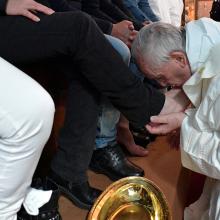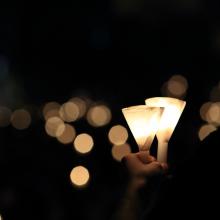Sin
Despite the discomfort some viewers might feel from the film’s visceral violence, Nightmare Alley is ultimately an old-fashioned morality tale, one in which del Toro refuses to let his central character escape the weight and judgment of his own actions. The film barrels towards the moment when Stan’s schemes fall apart with unrelenting brutality, and eventually Stan’s machinations begin to unravel. Nightmare Alley also thrills in the strong performances of characters: Cate Blanchett’s Dr. Lilith Ritter, cool and unflappable, always in control even when she seems not to be; Toni Collette’s Zeena, whose love is more complex than it initially appears.
Da’Shawn Mosley: What inspired this book?
Robert W. Lee IV: I’m a pastor first. But the events in Charlottesville, and our nation’s response, terrified me and inspired me to put pen to paper and say, “We gotta talk about this, because if we don’t, our silence becomes complicity.”
This summer marks the second anniversary of the white supremacy violence in Charlottesville. What is your read of where we are as a nation? Charlottesville will live in our collective history as an event of great horror. It was domestic terrorism. As we move forward, especially in the 2020 election, we’re going to have to talk about the deep chasm of racism that exists in our country without using it as a pandering mechanism to get votes. It’s important for us to care and be deeply concerned about these issues.
As a white man, how have you navigated wanting to be an ally and not be at the forefront of the movement while at the same time being catapulted into the public spotlight? It’s a learning experience. I hate to put it like that, but it is.
"We are all sinners. We all have defects," the pope told the inmates, in an improvised sermon broadcast by Vatican Radio.
By washing their feet, Francis told them, he was willing to do "the work of a slave in order to sow love among us". He urged them to help each other.
Two of the 12 are serving life sentences, and the others are due to be released between 2019 and 2073.
In short, I find myself quickly going beyond the limits set by those who speak most loudly about “getting the government out of our lives.”
I acknowledge, of course, that there are legitimate arguments that can — and should — be carried on about many specifics. When can a given service be most effectively provided by non-government groups and agencies? When does a top-heavy governmental bureaucracy itself become a detriment to the common good? These are important questions that must debated.
Any time a government enacts new legislation or a president signs an executive order, Christians must decide how it aligns with their ultimate mission, and choose to follow the example of Jesus accordingly.

Image via Lisa Missenda/Shutterstock.com
“You are dust, and to dust you shall return.” Every year on Ash Wednesday, I seek out some member of the clergy to say those words to me. They come from the curse of mankind in Genesis 3, but I find blessing in hearing them in the tale of the loving purposes of God.

Image via Karl R. Martin/Shutterstock.com
On Dec. 28, just before New Year’s Day, a Cleveland grand jury declined to indict the officers who killed Tamir Rice, a 12-year-old boy who had been playing with a toy gun in a park near his home. For many, the news resounded as yet one more tragic refrain in the long litany of our nation’s utter disregard for Black lives. Extinguished in the innocence of childhood, without even a second thought.
OK, I get that sin is an issue and I am despicable and Jesus is my only hope. God the Father loves me just as I am, but too much to let me stay that way.
However, I think about sin with the same ease as I do cancer. I either avoid it at all costs, or it becomes the center of my dark thoughts. I’m struggling with grasping the concept, and I hope someday I’ll arrive at the place where my theology and belief in a good God shelter me when I get the Tuesday afternoon call that the tumor is cancerous. The shit hits the fan, but I’m saved. Death is coming, but I’m unafraid.
I’m not there yet. It’s messy and anxiety-inducing. For each step I take forward in understanding the fall of humankind, my other foot takes a step toward grace that is so sweet and life-giving. I wouldn’t mind camping out at grace for awhile.

Image via Konstanttin/Shutterstock
The Ashley Madison hack — the public release of emails of wannabe adulterers — has now ensnared a theologian with a famous name in some Christian circles.
Robert Craig Sproul Jr., best known by his first initials, stepped up Aug. 31 to face his sorrow — and teach a lesson in God’s grace in the process.

Image via Anastazzo/shutterstock.com
I'm afraid Christians too often have overemphasized Jesus’ commandment, "Go and sin no more!" at the expense of his earlier phrase, "...Neither do I condemn you." Could it be that Jesus' admonition to "sin no more" is a jab directed instead at the religious leaders? That Jesus is telling them if they don't quit their sinning, the sin police will have them killed? And Jesus might not be there next time to save them?
Mad Men transported us to the pivotal decade of the 1960s and dealt deliberately with the advent of Madison Avenue and the heyday of the advertising industry. This was the time in our nation’s history when our materialistic fates were sealed: We became a people defined by things, things produced in mass quantities to feed an insatiable cultural appetite. And that appetite was fueled by advertising.
Don Draper, the quintessential ad man, describes advertising early on in the series as “selling happiness.” In the boardroom, Don repeatedly does exactly that — creating scenarios that attach emotional, if not transcendental, value to otherwise common products and services. He brings his clients to tears or laughter or both, and opens their wallets besides. Deals are closed, Clio Awards are won.
Is David Brooks becoming a Christian?
That’s the question that some people have been asking about The New York Times’ op-ed columnist, especially in the wake of his new book, The Road to Character.
As Jonathan Merritt wrote, “Brooks claims to have written his latest book ‘to save my soul,’ and he told NPR that reading books by authors such as Christian convert C.S. Lewis has ‘produced a lot of religious upsurge in my heart.’”
Brooks’ new book, The Road to Character, traces human virtue throughout the centuries, and then profiles a handful of “heroes of renunciation” who he believes serve as models of character. The book has sparked conversation about Brooks’ views on morality, theology, and even his own Jewish faith.
Brooks talked about society’s obsession with selfies, whether we’re too self-absorbed, and rumors about his own religious journey. Some answers have been edited for length and clarity.
IN A RECENT interview, Wendell Berry reiterated how perplexed he was that many Christians who are guided by a deep love for God can participate so willingly in an economy that is rapidly devastating God’s creation. In his new book One Nation Under God: How Corporate America Invented Christian America, Princeton historian Kevin Kruse offers a narrative that sheds light on how our churches got into the mess that Berry bemoans. As the book’s subtitle indicates, the primary story that Kruse traces is that of the genesis of “Christian America,” which unfolded not in the era of the Founding Fathers, as David Barton and other conservative Christians contend, but rather in the mid-20th century with industrialists who rallied churches to oppose FDR’s New Deal.

Mindmo / Shutterstock
WHEN I WAS 15, my church youth group was not a safe place. Like most youth groups, there were college-age volunteers who served as counselors and Bible study leaders.
One counselor, Paul, took it upon himself to constantly tell me I wore too much makeup, my clothes were too tight, and that I was a flirt. These actions took place in public for six months while other counselors and students watched and laughed. The interactions came to a head when he commented on my lipstick color and I snapped back at him. He grabbed me, forced me onto his lap, and told me I liked it.
At the time, I just thought Paul was creepy; I now recognize his behavior was sexual harassment. I also recognize that the other members of my youth group, including the leaders, saw his behavior and failed to intervene. Why did this happen? Both Paul’s behavior and the leaders’ silence belong to a larger set of attitudes in our culture—and churches—that allows sexual violence and sexual harassment to become normal, even expected, behaviors.
This set of attitudes is known as “rape culture.” When we fail to confront these toxic attitudes in our churches, we undermine our love for our neighbors, ignore the Bible, and misrepresent God as misogynistic.
I gave up street evangelizing a long time ago. It was a short-lived career — a few weekends into town with a friend, praying for God to help us meet someone we could share Jesus with. It quickly (thankfully) became clear to me that this business of following God is much better done in the context of long-term relationships with a broader understanding of salvation and mission.
Any time we try to confine the big and beautiful Good News of God into a simplistic message small enough to fit onto a tract or a 10-minute awkward conversation, we cut out too many important details. The truncated gospel of the Four Spiritual Laws requires that we get to the point — Jesus is the answer — as quickly as possible, lest our conversion, I mean, conversation partner gets away from us.
For Jesus to be the answer, there’s got to be a problem, and so we belabor the problem in order to solve it.
The mathematical equation of the gospel made sense to me when I was a child and perhaps into young adulthood. Prove the problem and solve the equation. Everything was simple, organized, and neatly categorized.
Somewhere along the way, it stopped making sense.
I WAS ONCE told that “racism is our nation’s original sin.” This statement jolted me. While I didn’t dispute its truth, I have come to realize racism is much more complex than this.
In order to dismantle the structural sin of racism, we have to first set it within a larger context that acknowledges racism’s sociopolitical dependency and structural interconnectedness.
First: “race” is not real. It is not a scientific category; biologically, it does not exist. Race is a social construct, something built systematically. It has no inherent value or true significance beyond what we give it. In order for race to have real social consequences—which it undoubtedly does—there must be other phenomena at work that validate, sustain, and reinforce the social significance of race.
As a result of sin in our fallen world, human bodies are appraised and given a value based upon certain criteria. As a result of sin, men are privileged over women, white skin is privileged over darker skin, able bodies are privileged over disabled bodies. Historically, certain bodies are acclaimed while others are defamed. Race plays a starring role in this larger drama of embodiment.
“God is in control.”
The statement comforts many people because deep down we know that we are not in control. We can do everything we can to protect ourselves and our families, but we know that despite our best efforts, tragedy can strike at any moment. And so it’s comforting to believe that if we aren’t in control, Someone else is.
But something inside of me recoils whenever I hear the phrase, “God is in control.” Many believe that God’s sovereignty means that God is behind everything that happens. But I find no comfort in that view of God. In fact, a God who micromanages and controls every event isn’t a God worthy of belief.
When I share the story of how brutal the path to citizenship is for us, people are often shocked. We are not what people have in mind when they think of ‘immigrants.’ We are white. We speak English. We have graduate level degrees. And yet even for us, as documented workers, it sometimes seems nearly impossible that we will be able to gain permanent residency. The path is so much narrower and steeper than people realize, so we speak up.
I speak up because I would love legal residency to be more easily within our reach. As a mom, it would give me so much peace of mind to know we could continue to build a life in the U.S. with our children. But mostly, I speak up because I can. As a legal immigrant, I have a first-hand perspective on just how harsh the current legislation can be, and I also have the freedom to speak about it without fear of being deported.
And so I speak and write in favor of equitable and reasonable immigration reform. I believe it is the right thing to do ethically, and it is the wise thing to do socially and economically. However, whenever I raise the issue I am met with this response: “We’re not objecting to you — because you got here legally and have obeyed all the laws. We are objecting to all the law-breakers who are here illegally: if they disrespected the law, they should not be rewarded for it!”
MOST discussions about the Bible and homosexuality are limited to a handful of passages and the subject is viewed as a moral issue in which the burden of proof is placed on lesbians and gay men to defend our right to be who we are in light of those passages. If we approach scripture understanding that heterosexism, like sexism and racism, is a justice issue, then we move to a different plane of inquiry.
We might then understand that what is at stake in questions of sexual morality is not sexual orientation per se but rather the rightful or wrongful use of sexuality whatever our orientation. Sexual sins can occur in both heterosexual and homosexual relationships wherever people are exploited, abused, neglected, or treated as objects. On the other hand, love, commitment, tenderness, nurture, respect, and communication can be expressed in both homosexual and heterosexual relationships.













